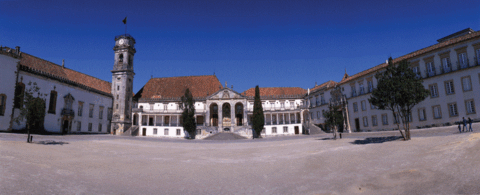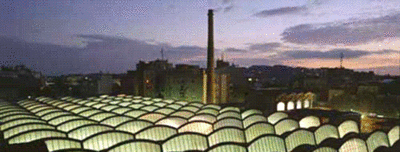PIN | Salzburg Research | The University of Coimbra | Museu de la Ciència i de la Tècnica de Catalunya | Universitatea de Vest din Timisoara | MFG Medien- und Filmgesellschaft Baden-Wuerttemberg
PIN – Servizi Didattici e Scientifici per l’Università di Firenze s.c.r.l. - Italy

PIN – Servizi Didattici e Scientifici per l’Università di Firenze s.c.r.l. is a regional centre created by the University of Florence, the Municipality and Province of Prato and regional entrepreneurial associations to support research and university courses in Prato. Research activity is organized in laboratories and PIN VastLab is the one in charge of CreativeCH.
PIN VastLab has long-standing expertise in EU funded research, training and professional development of young researchers and practitioners in the field of digital cultural heritage; VAST-LAB’s staff combines a thorough understanding of both the content and contexts of cultural heritage and the deployment of ICT for their communication.
CONTACT PERSON:
Prof. Franco Niccolucci
Salzburg Research - Austria
Salzburg Research is the non-profit research organisation of the State of Salzburg. Since 1996 the organisation conducts applied technological and socio-economic research in ICT.
Main application areas are digital media; tourism & transport; culture & heritage; and education. SRFG has long-standing experience in EU cooperation projects, both as coordinator and partner, in the Framework Programmes, Interreg, Lifelong Learning and eContentPlus.
SRFG also runs two national competency centres that are cofunded by ICT, media and tourism businesses (Salzburg NewMediaLab; eMotion – ICT for the tourism and leisure industries).
The SRFG eCulture Group, active since 2000, has a strong focus on advancing the use of ICT in the heritage sector.

The University of Coimbra, Portugal

The University of Coimbra is an indisputable reference in higher education and research in Portugal, due to the quality of the courses taught at its eight Faculties and to the advances achieved in pure and applied research in various areas of knowledge, in Portugal and in the world.
The prestige of the University of Coimbra may be demonstrated by the position it holds in the international rankings of universities and research centres.
This University is not only a true icon of Portuguese culture in the world, but it also pursues a policy of constant improvement in various fields, which allow it to reassert the high quality of research and teaching, as well as an active role in the development of businesses and industry, and in activities involving intensive knowledge in Portugal in connection with pioneer multinational and international organisations working for the advance of science and knowledge.
Museu de la Ciència i de la Tècnica de Catalunya (mNACTEC) - Spain

The Generalitat of Catalonia is the institution under which the autonomous community of Catalonia is politically organised and its Departament de Cultura is the responsible department for culture and the media.
The project work will be carried out by the Museu de la Ciència i de la Tècnica de Catalunya (mNACTEC) which is the leading Catalan museum for science and technology.
The Museum aims to preserve, present and promote the region's industrial heritage and manages a network of 25 industrial heritage sites/centres in Catalonia. The museum has developed a significant tourist program based on these centres and other industrial sites in Catalonia.
A 3 year tourism development programme created Industrial Tourism Network of Catalonia (XATIC), an association of 17 municipalities which is growing and involves other municipalities and private sites.
mNACTEC also promotes relationships between research centres, companies and society through projects such as Connect with Innovation (2009-2010) that realised a touring and online exhibition co-developed with Leitat Technological Centre, Universidad Politécnica de Cataluña and regional companies (funded by the Fundación Española para la Ciencia y la Tecnología).
Universitatea de Vest din Timisoara - Romania

The West University of Timisoara was founded in 1944 and completely restructured in 1989, profiting of this opportunity through adoption of international standards and innovative methods in teaching and research.
The department in charge of CreativeCH will be the Faculty of Letters, History and Theology (LIT). Besides a study branch of “Cultural Studies”, LIT has been involved in collaborations with heritage institutions such as the regional directorate for culture and cultural heritage, the Banat museum in Timisoara, the museum of the Rural Culture, the Timisoara Art museum and associations that promote and manage regional/local cultural and creative activities such as festivals.
MFG Medien- und Filmgesellschaft Baden-Wuerttemberg, Germany

MFG Baden-Württemberg is a regional public innovation agency for ICT and media, based in the South-West of Germany. MFG’s mission is to support and foster the IT, media and related business sectors in the region of Baden-Württemberg.
With its two main shareholders being a regional state ministry and the regional public broadcaster (SWR) MFG has now been active for nearly 15 years at the interplay of creativity and technology by fostering an interdisciplinary sector approach. This encompasses ICT, creative industries and IT application areas.
MFG also hosts a variety of clusters and networks and delivers targeted services (ISO 9001 certified) in the area of innovation management, technology transfer and regional development and marketing.
MFG is also one of the founding members and chairs the European Interest Group on Creativity and Innovation e.V. (formally established in May 2010), a pan-European initiative of more than 30 regional and local development agencies, research institutions, companies and support organisations that foster the relationships between creativity, culture, technology and innovation.





